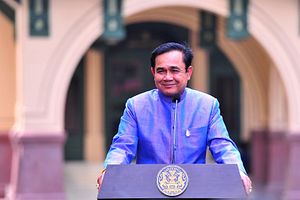To some observers, Thailand’s Prime Minister Prayut Chan-o-cha’s upcoming official visit to the United States in July is seen as a re-establishment of U.S.-Thailand relations. After all, the relationship took a hit following the 2014 coup to oust the Yingluck government. Washington had condemned the coup and urged the Thai military to restore civilian rule as well as respect for human rights and fundamental freedoms. Many senior U.S. officials warned at the time that U.S.-Thailand relations could not return to normalcy unless full democracy was restored.
Prayut’s official visit to the United States, however, must not be taken as Washington’s full recognition of the coup and the military regime. Although Prayut’s visit arises from an invitation by U.S. President Donald J. Trump, it is unlikely to lead to America’s abandonment of its own fundamental values. The U.S. system, with its established institutions and values, is much bigger than the president. Nevertheless, Prayut could take this opportunity to establish a personal relationship with the current president, in the hope of encouraging future American support in Thailand’s domestic development and economic projects.
U.S.-Thailand Relations
The United States and Thailand have enjoyed a longstanding bilateral relationship since the end of World War II. During the Cold War, the United States and Thailand formed a strong partnership to contain the spread of communism in the region. In the post-Cold War era, the two countries have redefined their relationship to meet global challenges such as terrorism and transnational crime. However, the United States was forced to curtail its engagement with Thailand after the ouster of Prime Minister Thaksin Shinawatra in 2006. Bilateral relations improved only shortly before the 2014 coup and declined immediately afterwards.
Since then, the relationship between the United States and Thailand has in truth seldom been harmonious. Declining U.S.-Thai relations have resulted in strains – at times, even negative remarks – between senior representatives of the two countries. For instance, Daniel Russel, then the U.S. assistant secretary of state for East Asian and Pacific affairs, visited Thailand in January 2015. During the visit, Russel commented that the impeachment and corruption charges against Yingluck Shinawatra were politically motivated, and that the military regime was losing credibility. Prayut retorted angrily by stating that the United States did not understand Thailand’s efforts in maintaining political stability.
Meanwhile, Washington cut the amount of military and security aid to Thailand. The Cobra Gold military exercises were reduced in scale and restricted in scope by excluding the amphibious landing component and focusing on Humanitarian Assistance and Disaster Relief (HADR) operations. Ever since the 2014 coup, the number of U.S. military personnel involved in the Cobra Gold exercises has stood at around 3,600 annually, down from 9,500 in 2013. Although both countries seem keen to maintain the exercises, the scale and scope is dependent on the political developments in Thailand.
A perceived turnaround came when Trump made a phone call to Prayut to reaffirm the longstanding alliance between the United States and Thailand. Both Trump and Prayut also expressed a shared interest in strengthening trade and economic ties between the two countries. The phone call perpetuated a series of comments which suggested that a “new era” in the U.S.-Thai relations was dawning. As Panitan Wattanayagorn, a security adviser to Deputy Prime Minister Prawit Wongsuwan, said: “Differences and changes in domestic settings and different policies that created friction and tensions between the two countries are now seemingly over. This is a new era built upon old ties but looking forward for better cooperation and challenges in the years ahead.”
Managing Expectations
But Trump’s phone call must be understood in context. The call was meant to rally support in containing North Korea’s nuclear threat rather than signaling a full recognition of the military regime. As with Trump’s approach to international affairs in general, the outreach to Prayut was truly transactional. As such, it must not be seen as a complete positive turn in U.S.-Thai relations. In fact, there are still some issues which Trump would like to “sort out” with Thailand. For one, the Trump administration views U.S.-Thai trade as problematic, since Thailand has a trade surplus of $18 billion with the United States. Trump thinks this large trade deficit is a serious problem for his country.
Thus, Prayut must take extra care in not expecting a “new era” in U.S.-Thai relations where deals could be struck. With this upcoming visit, Prayut could learn from Japanese Prime Minister Shinzo Abe, who visited the United States in February 2017. Abe shrewdly avoided tricky issues during the two days he spent with Trump and sought to establish a personal relationship through “golf diplomacy.” The point to stress is that given the dynamic nature of Trump and the lack of knowledge in terms of his foreign policy agenda, a personal relationship would be sufficient in helping Prayut to reaffirm Thailand’s support for the United States. Attention can then be later directed toward areas of mutual benefit and fruitful bilateral cooperation, while minimizing points of contention.
Eugene Mark is a Senior Analyst with Singapore’s S. Rajaratnam School of International Studies (RSIS). He has a deep interest in Thailand’s political and security affairs.

































